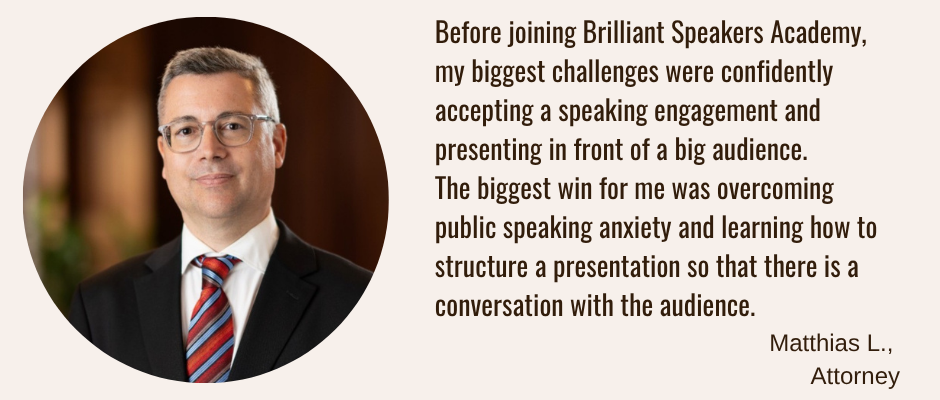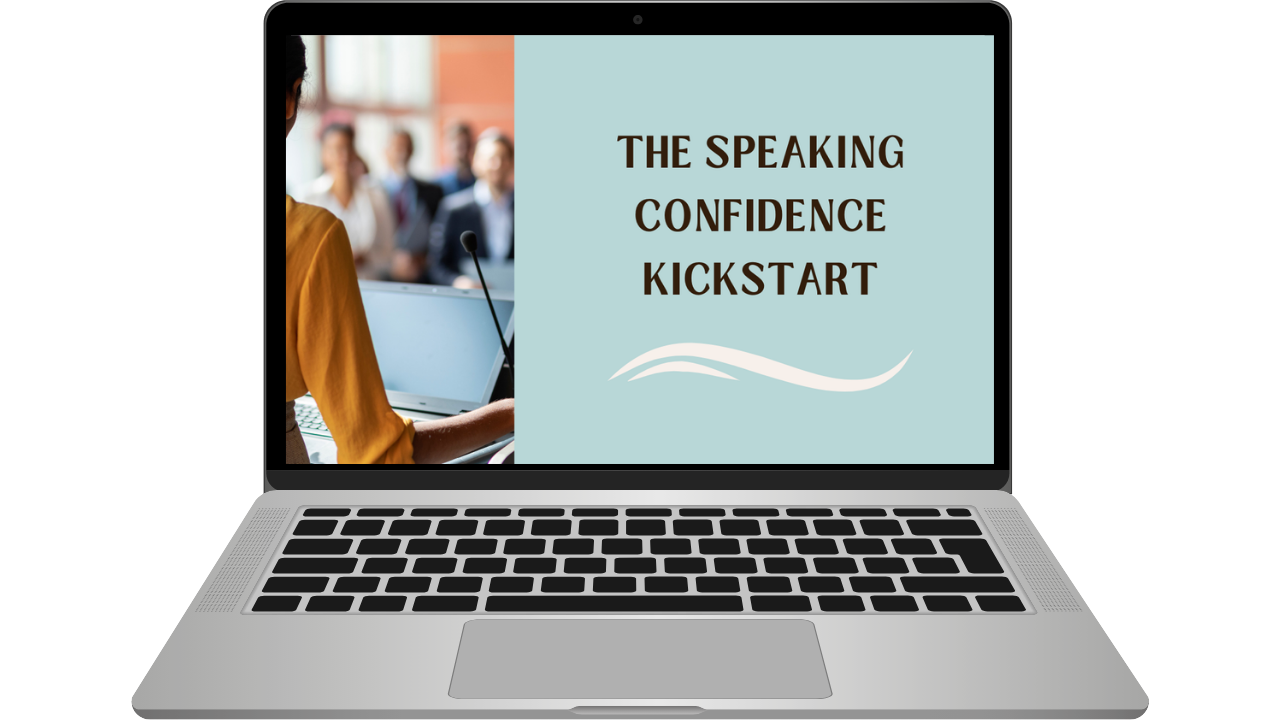Want to Speak Like a Pro?
Stop Trying to Be Someone Else
By Victoria Lioznyansky, M.S., M.A.
Have You Ever Thought, “If Only I Could Speak Like Them…”?
You’re watching someone on stage.
They’re commanding the room, radiating confidence, making it look effortless. And you find yourself thinking...
“If I could speak like that, I’d finally feel confident.”
Whether it's the calm assurance of Morgan Freeman, the electrifying energy of Tony Robbins, or Oprah’s soul-level connection, we often assume confidence looks a certain way. That there’s a “right” way to show up as a speaker.
It’s easy to fall into the trap of believing that you have to become someone else to be great.
But here’s what no one tells you:
You don’t need to sound like anyone else to be a phenomenal speaker.
You just need to sound more like you.
And when you try to mimic someone else’s style, no matter how polished or powerful, it chips away at your confidence instead of building it.

The Confidence Trap: “If I Spoke Like Them, I’d Be Confident”
I hear this all the time from high-level professionals, leaders, and entrepreneurs:
“If I had her energy...”
“If I had his voice...”
“If I could just speak like them, I’d finally feel ready.”
But here's the truth:
You weren’t born to be a version of someone else. You weren’t built to be a copy.
You were built to communicate your story, your voice, and your message — your way.
And confidence doesn't come from trying to look confident.
It comes from alignment, when your delivery, your message, and your identity are in sync.
To show you how different real confidence can look, let’s take a look at six world-class speakers with radically different styles. Each one effective, unforgettable, and uniquely themselves.
Morgan Freeman: Calm Authority
Morgan Freeman doesn’t shout to get your attention.
He doesn’t pace the stage or raise his voice.
Instead, he speaks slowly. Intentionally. Every word feels like it matters.
What He Teaches Us:
You don’t need to be loud or overly expressive to hold a room.
His strength is restraint. It’s the unshakable confidence that comes from stillness, not showmanship.
For introverts or more reserved speakers, this is a powerful reminder that quiet presence can be magnetic.
Try This:
- Pause between key points.
- Let your voice drop, not rise, when you want people to listen.
- Trust that your presence is enough.
You don’t need to push.
You just need to stand in your message with clarity.
Tony Robbins: Energy in Motion
If Morgan Freeman is stillness, Tony Robbins is movement.
He’s a force. He doesn’t just speak, he charges the room with energy, intensity, and physicality.
What He Teaches Us:
When your body and voice align with your message, your audience feels it.
Tony doesn’t fake his energy. It’s authentic. It’s big. It’s powerful.
If you’re naturally expressive, don’t suppress that fire — channel it.
Try This:
- Stand when you speak, even on Zoom.
- Use your body to support, not distract from, your message.
- Speak with your whole self, not just your mouth.
Energy doesn’t need to be loud. It needs to be true. That’s what makes it stick.
Oprah Winfrey: Heartfelt Connection
Oprah speaks from the heart.
She listens deeply. She shares vulnerably. She makes people feel safe, seen, and understood.
She doesn’t perform. She connects.
What She Teaches Us:
People don’t follow speakers. People follow connection.
If you’re someone who leads with empathy, leans into conversation, or prefers storytelling over instruction, this is your lane.
Oprah proves that being emotionally present is more powerful than delivering a perfect script.
Try This:
- Open your talk with a personal story or reflection.
- Make eye contact and soften your tone.
- Let your humanity come through — mistakes and all.
When people feel your heart, they trust your message.
Simon Sinek: Purpose-Driven Clarity
Simon doesn’t need flash or flair to capture attention.
He explains deep concepts with striking simplicity. And every idea ties back to a clear “why.”
What He Teaches Us:
When your message is clear and rooted in purpose, you don’t have to “sell” it.
People don’t need you to be flashy. They need you to be clear.
Clarity creates confidence. And confidence creates influence.
Try This:
- Before you speak, ask: “What’s the deeper purpose behind this message?”
- Strip your talk down to one core idea.
- Build everything around that one idea.
If you lead with purpose, your audience will follow.
Brené Brown: Brave Vulnerability
Brené doesn’t hide her fear. She walks through it, right in front of us.
She stumbles. She laughs at herself. She shares her failures.
And she draws us in with her honesty.
What She Teaches Us:
You don’t have to wait until you feel fearless to be effective.
In fact, the more real you are, the more relatable you become.
Your vulnerability isn’t a liability. It’s your greatest strength — if you own it.
Try This:
- Acknowledge your nerves before you speak.
- Share a moment you overcame something difficult.
- Don’t try to “be confident” — be present.
Authenticity wins hearts. Every time.
Michelle Obama: Graceful Power
Michelle Obama doesn’t demand attention.
She earns it with elegance, depth, and poise.
Her presence is quiet, but her impact is loud.
What She Teaches Us:
You don’t need volume to be powerful.
Grace is a form of strength.
If you lean toward calm, composed communication, Michelle shows that you can lead without theatrics.
Try This:
- Use stillness as a tool, not a gap.
- Let your tone stay grounded, not performative.
- Speak slowly, clearly, and with purpose.
You don’t have to fight for space. You simply need to own it.
FREE GUIDE
We never spam or share your data. You may unsubscribe from these communications at any time.
Why Copying Great Speakers Doesn’t Build Confidence
Let’s be clear. Studying great speakers is smart.
But copying them? That’s where things fall apart.
Because when you try to imitate someone else’s delivery, your body knows.
Your brain knows. And suddenly, fear kicks in, not because you’re not prepared, but because you’re not aligned.
You feel like a fraud because you're not showing up as you.
That disconnect is what triggers imposter syndrome, dry mouth, shaky hands, and blanking out.
Confidence isn’t about performance.
It’s about authentic presence.
Bonus: A 3-Minute Confidence Exercise That Actually Works
Here’s something I teach all my clients, especially before high-stakes speaking moments.
It’s fast. It’s effective. And it works.
Step 1: Ask the right question
Not:
- “What will they think of me?”
- “Will I mess up?”
- “Do I sound smart?”
Instead:
“How do I want my audience to feel?”
This shifts your focus off yourself and onto your audience — which immediately reduces fear.
Step 2: Choose one feeling to anchor your talk
How do you want them to feel by the end of your message?
- Inspired?
- Safe?
- Energized?
- Seen?
Pick one.
Step 3: Speak from that intention
Let that emotional outcome shape:
- Your tone
- Your pacing
- Your content
- Your presence
When you’re speaking for them instead of about you, confidence comes naturally.

Final Thought: You Already Have What It Takes
Here’s the truth I want you to take with you:
You don’t need to become a different person to be a confident speaker.
You don’t need to be louder, bolder, funnier, or more “inspiring.”
You just need to strip away everything that isn’t you, and speak from who you already are.
Confidence doesn’t come from performance.
It comes from alignment.
And the moment you stop trying to sound like someone else and start trusting your own voice — that’s the moment you become a leader worth listening to.
Ready to Speak With Confidence — Your Way?
If public speaking has been holding you back... if you know you’re capable of more but don’t know how to get there...
Let’s talk.
Book a free strategy call with me
We’ll dive into:
- What’s blocking your speaking confidence
- What you truly want to say (but haven't yet)
- How to close the gap between the expert you are and the speaker the world sees
Whether it’s coaching, group training, or a tailored step-by-step system, I’ll help you find the best path for you.
Click here to schedule your free call.
You don’t need to do this alone.
Let’s find your voice and your power together.

About Victoria Lioznyansky, M.S., M.A.
Victoria has helped hundreds of executives, professionals, and entrepreneurs overcome their fear of public speaking, transforming them into confident, assertive, and captivating speakers. Having once been a very nervous speaker herself, Victoria is now a sought-after public speaker and the founder of Brilliant Speakers Academy®, an online public speaking coaching program. She also hosts the Confidence Within podcast.

FREE MINI-COURSE: The Speaking Confidence Kickstart
Learn the first real step to speaking with calm, clarity, and confidence, even if public speaking fills you with anxiety.
GRAB THE FREE TRAINING
